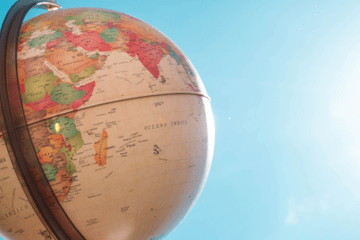
What Does the Global Cannabis Market Look Like?
Published on 11/9/21
When we discuss weed and the cannabis industry, we usually talk about the United States (and sometimes Canada), but in truth, there's a much bigger global market out there that accounts for a lot of weed. Let's take a look at the global cannabis market, the legalization of cannabis across the world, and how the US stacks up in comparison.
Different Cannabis Markets Across the World

Please note that we are focusing on legal cannabis markets across the globe. While the black market still accounts for the majority of sales, legal marijuana is closing the gap. As of 2021, there are only two countries in the world with legalized recreational marijuana nationwide. Uruguay legalized adult-use weed in 2013 and Canada followed suit in 2018. A handful of countries have decriminalized marijuana or have legalized certain aspects of recreational weed like possession or personal use. These countries include South Africa, Mexico, Georgia, The Netherlands, Ecuador, Jamaica, Colombia, Belgium, Portugal, Spain, The Czech Republic and Croatia. A myriad of other countries, many of which are in Europe, have legalized medical marijuana for certain members of the population. However, the largest cannabis market belongs to the United States, where cannabis is still federally illegal and only legal at the state level. When analysts look at the global cannabis market, they generally break markets into larger regions: North America, Europe, Asia Pacific, South America, Middle East & Africa. Let's take a look at the top global markets.
North America
The United States hit a record $17.5 billion in 2021 sales and is estimated to hit upward $24 billion in 2021. Canada rounded out 2020 with $2.6 billion and is expected to reach over $4 billion in 2021. Mexico is estimated to have roughly $3.2 billion in potential market value, but the exact numbers won't be known until the country legalizes recreational marijuana. Of the world's approximate legal cannabis market sitting at $20.5 billion in 2020, North America accounts for over 90%.
South America
Along with Canada, Uruguay is the only other country in the world that has officially legalized recreational marijuana, although their annual revenue caps out at around $3 million. Other countries like Colombia, Peru and Chile have legalized medical marijuana. Like Uruguay, these country's annual revenues are much lower than North America's, but that doesn't mean there isn't a market for it.
Europe
A little over half the countries in Europe have either legalized medical marijuana or have relatively lenient policies. These countries include Denmark, Germany, Finland, Greece and the United Kingdom. Out of 44 countries, 21 have marijuana still listed as a highly illegal substance. Most all of Europe's cannabis revenue is medical.
The Rise of the Global Cannabis Market
 Unsplash
UnsplashAs annual revenue rates suggest, the global cannabis market value is mostly defined by what's happening in the United States. In the US, 36 states have legalized medical marijuana, and 18 states have legalized recreational weed. The first state to legalize medical marijuana was California in 2018, and the first states to legalize recreational weed were Colorado and Washington in 2012. Canada has also been a major driving factor. The country legalized medical marijuana in 2001 and recreational marijuana in 2018. Since then, nationwide sales have steadily increased. Mexico has had confusing cannabis legality since 2015, with their supreme court decriminalizing use and claiming current laws unconstitutional. This confusion has limited growth but is expected to change soon. Many countries in South America legalized medical cannabis around 2015 with steadily growing numbers. The story is similar in Europe, where many countries have medical infrastructures that allow for costs to be completely covered for citizens. In addition to this, Europe has also seen a lot of growth due to social acceptance and more studies for medical applications that have driven usage.
The Future of the Global Cannabis Market
Just like in the United States, global cannabis industry growth is looking up. As revenues increase, so does overall acceptance, pro-cannabis policy and cannabis industry jobs. There are many countries set to legalize marijuana that will change the entire global cannabis landscape. The most recent change that could quickly cause a shift in the global cannabis market is Mexico's recent bill approval to legalize recreational marijuana. In a 316-129 vote, Mexico's lower house has put into motion policy change that some think could put Mexico as the top cannabis market in the world (although some economists say otherwise).
The future of the global cannabis market is projected to see generous increases over the next several years, but the exact numbers vary based on who is collecting the cannabis industry statistics. According to Grand View Research, the global cannabis market will reach $70.6 billion by 2028 with a compound annual growth rate (CAGR) of 26.7% during that time. But if you look at Business Wire's projections, the global market may reach 90.4% by 2026 with a CAGR of 28%. This rapid value increase is based on increased medical applications and viability, continued legalization, and widening social acceptance of cannabis. Europe is projected to grow the most over the next five years, based on the CAGR rate, because of the region's medical cannabis programs and studies. Check back in here for updated global cannabis industry news!
CBD and the Global Economy
 Unsplash
UnsplashAs its own market, CBD is also expected to grow over the next several years. In 2020, the American CBD market was valued at $2.8 billion and is expected to grow at a CAGR rate of 21.2% between 2021 and 2028. By 2028, the global market is projected to increase to $13.4 billion. However, even compared to the global cannabis market, North America has an even larger percentage of the over global CBD market and the data suggests this won't change anytime soon.
Are you an international traveler or citizen? Let us know where you've got experience with cannabis, what that experience has been like, and how you think it might change in the upcoming years. Comment below!


















